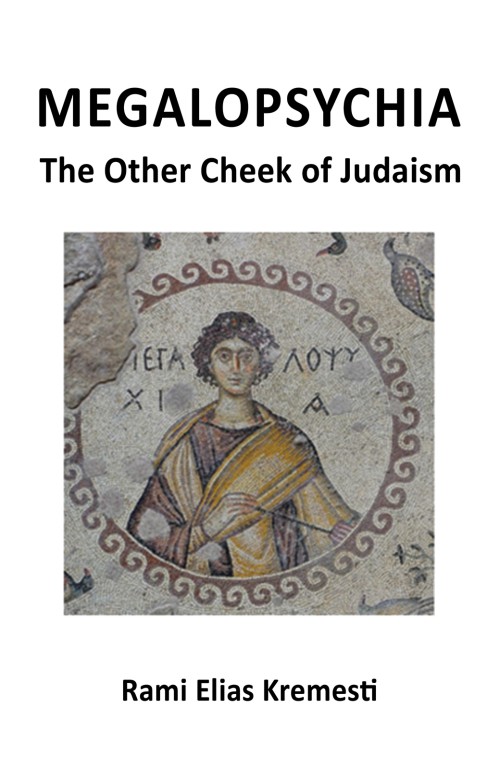
*Available directly from our distributors, click the Available On tab below
Rami Elias Kremesti is a UK chartered scientist specialising in water treatment. His first love was chemistry. His second love is philosophy. After spending many years in the dark prison of depression and confusion, gradually, the self-imposed walls of ignorance started to crumble and the bright light came in… This is his third book which aims to dispel all the antisemitic lies he grew up with in his home country of Lebanon. In his first book, The Other Cheek of Islam, he reached out to his Muslim brothers. In his third one, he reaches out to his Jewish brothers.
MegaloPyschia, with an apt definition, has been a rather distinguishable reading experience. The merge between first person and educational tone is utilisable for both learning and keeping the element of a literary element. While Rami noted that his greatest fear is ignorance, mine is oblivion. Departure from this value has been able to reveal itself in how the book unfolds itself, and how Rami authored the book. I thought I knew enough about Judaism, but the book begged me the question — was it oblivion to not impart myself with such knowledge, or was it simply ignorance? I could argue that it is both. This book is an ultimately different take on Judaism as a religion and a cultural heritage. To begin with, MegaloPsychia confronted me with the occupation of Jewish writers in the literary world. As a writer myself, unpicking some of the writers I grew up reading and their upbringing background enlightened me. Authors such as Elie Wiesel, Isaac Bashevis Singer, Imre Kertész, Iosif Aleksandrovich Brodsky, and Nadine Gordimer have explored a myriad of themes that have sparked a lot of resonance. “Brodsky is the only modern Russian poet whose body of work has already been awarded the honourary title of a canonised classic… Brodsky’s literary canonisation is an exceptional phenomenon.” “Gordimer’s writing dealt with moral and racial issues, particularly apartheid in South Africa. Under that regime, works such as Burger’s Daughter and July’s People were banned.” The linking of Judaism and other disciplines such as (psychology, journalism, law, politics, history, and science), made me look into them differently, especially after reading part two of the book. The connection between diamonds and Jewish culture, as well as the historical symbolism, was outstanding. Rami has you gazing into different religions — Judaism, Christianity, and Islam and their close relation in a highly enlightening way. I wish I had this sort of book to source from during my undergraduate, studying philosophy of religion. It would have been phenomenal to use his views on monotheism and philosophy. Rami uses a lot of substantial bits to support Monoethism, there is a testimony by a Jewish professor, James Tour who explores the impossibility of the appearance of life from pure abiotic chemical sources, random molecular collision, and time. There is also a quote in another part of the book: “Many great empires rose and fell since 4000 years ago when the Jewish Babylonian period started to be recorded in the Bible with Abraham, the father of the Monotheistic religions…and what is left of them is only a memory or decadent countries.” On page 283, Rami talks about how there are views that regard religious teachings about God as compatible with modern scientific understanding of biological evolution and then goes on to use an example of how science has failed to explain the mind and consciousness. These would be great arguments around the questions of God’s existence. The trail of of adversity this book shows is a great learning point, I was able to trace it back to the enslavement in Egypt to the covenant at Mount Sinai, the narrative traces the indomitable spirit of the Jewish people and their faith in God's promises. “Moses led the Jews out of slavery in Egypt and took them to the Promised Land which God had promised to give to them. The Jews were known as the Hebrews back then…they had not received the Torah yet in the Sinai desert. The word Hebrew has the same root as Arabic ‘Ghabra’ which means dust—for they were dusty slaves, due to their work in construction.” What I would have appreciated to have read more about was women, other than those from the entertainment industry, as it would have accommodated a solid intersectional approach when it comes to adversities of gender and religion. Another fascinating concept was from the chapter, ‘The Jewish Hero or Heroine’, a totally different view of what a heroine is in modern English and literary culture. It raises a lot of questions from feminist views, around the “Esther, and the “Good Woman” notion. One of the greatest figures that I follow their work, and views, such as Kafka, Freud, Kant, Amy Winehouse, Amichai, Elizabeth Gluck, and the list could go on, in their core, Rami was able to invite us into the concept of harmony, and or resilience. I found myself challenged to confront my preconceptions and biases. All in all, this book was a ride, how Rami was able to touch on so many themes, views, history, and perspectives around Judaism is one I would like to revisit time and again to challenge myself.
We use cookies on this site to enhance your user experience and for marketing purposes.
By clicking any link on this page you are giving your consent for us to set cookies